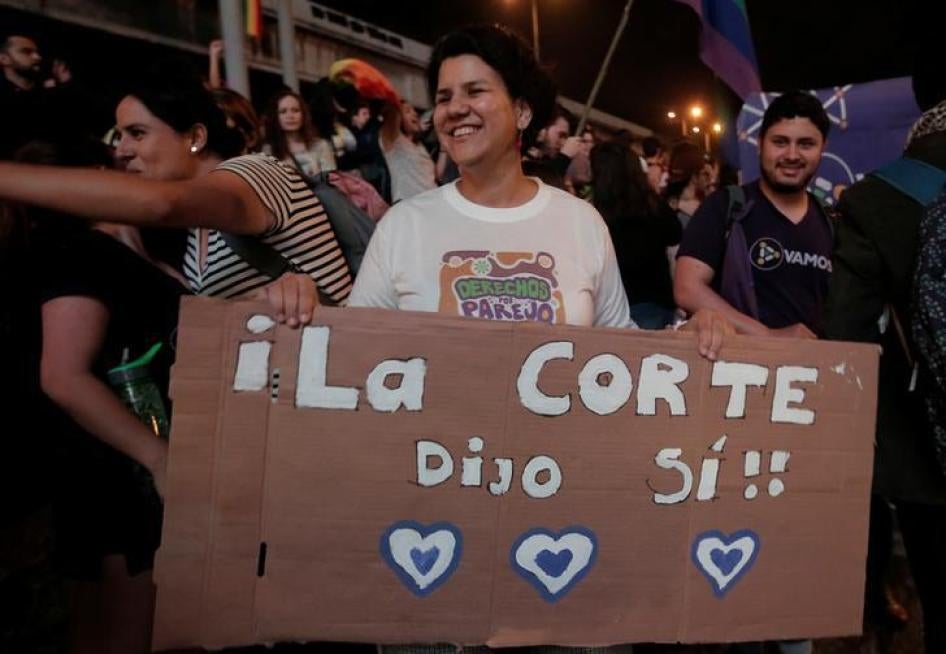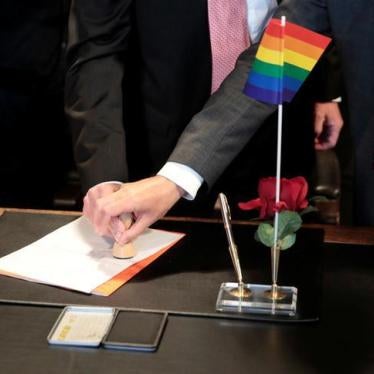In a moment when some countries have stepped back on LGBT rights, a January 9th decision by the Inter-American Court of Human Rights has opened a window of opportunity for Latin America to lead the way.
In a landmark advisory opinion, the court affirmed that the American Convention on Human Rights requires countries to allow same-sex couples to access civil marriage, and all of the rights and benefits that derive from it. It also asserted that governments should allow people, through a fast, easy and cost-free process, to change their name and gender marker on official documents, in accordance with their self-perceived gender identity.
Conservative lobbyists in Latin America quickly suggested that the court’s advisory opinions don’t directly obligate other countries to comply. But the court’s authoritative guidance leaves no doubt that the American Convention does indeed guarantee these important rights to LGBT people. And state parties are required to take the court’s opinion into consideration in developing their own laws and policies.
In terms of marriage equality, the opinion is a gigantic leap forward. Of the 20 countries that are parties to the American Convention, only Argentina, Colombia, Brazil and Uruguay recognize same-sex marriage nationally. Mexico does too, but in two thirds of its states, same-sex couples must undertake a slow, burdensome and costly judicial procedure not required of different-sex couples. The court´s interpretation is that all 20 countries are obliged to allow same-sex couples to marry, with all of its benefits and rights. This comes at a particularly key moment for Panama, Chile and Costa Rica, which have engaged in national debates around the issue over the last few months.
The most extensive and ground-breaking part of the opinion, however, has to do with legal gender recognition. In most Latin American countries, transgender men and women can’t change their gender marker in public records and legal documents. Some countries allow it, but only through a complex, costly and time-consuming process involving court appearances (as in Peru), psychological evaluation (in Bolivia), or in the case of Uruguay, approval by an “inter-disciplinary committee.”
Others, like Ecuador, will make the change but also imprint a permanent marker on the person’s records, which can be even more stigmatizing. Only Argentina, Colombia and Mexico City allow name and gender reaffirmation in a fast, easy and inexpensive manner.
Legal recognition of one’s gender identity is not only essential for a person’s dignity, but for access to the most basic public services, including social security, public safety, and justice. Not having gender-matching documents can result in denial of services, travel restrictions, bullying, humiliation, and even violence.
The court said that all 20 countries should adopt a simplified process that allows anyone to change their name and affirm their self-perceived gender identity in all public records and documents. The process should be confidential, free, and not require surgery or hormone treatment.
Translating the court’s eloquent opinion into reality across the region, however, will require work, determination and political will.
For the past two years, conservative movements have led a strong backlash against LGBT rights across the Americas. In 2016, they managed to turn Mexican President Peña Nieto´s own party against him, blocking his constitutional bill on marriage equality in congress. Last year, the opposition derailed a proposed LGBT-inclusive curriculum in Peru. And most recently, people have rallied in Paraguay and Ecuador, claiming a need to defend the “traditional family” from so-called “gender ideology.”
The upcoming elections in the region, including in Costa Rica, Mexico, Brazil, and Colombia, could also put these measures on hold with lawmakers reluctant to incur the political costs of supporting the rights of a minority.
But the Inter-American Court’s advisory opinion could well be the fuel that LGBT advocates needed, not only to resist efforts to roll back LGBT rights, but to push wavering countries into the lead in the international arena. The opinion will become an asset that activists can immediately use before national courts, lawmakers, and most important, before the general public. By making clear that the American Convention guarantees the rights of LGBT people to civil marriage equality and legal gender recognition, the Inter-American Court has redirected the debate.
Latin America can lead the way for LGBT rights in 2018. The question is whether regional governments and lawmakers will have the courage and the capacity to take advantage of this unique opportunity.








